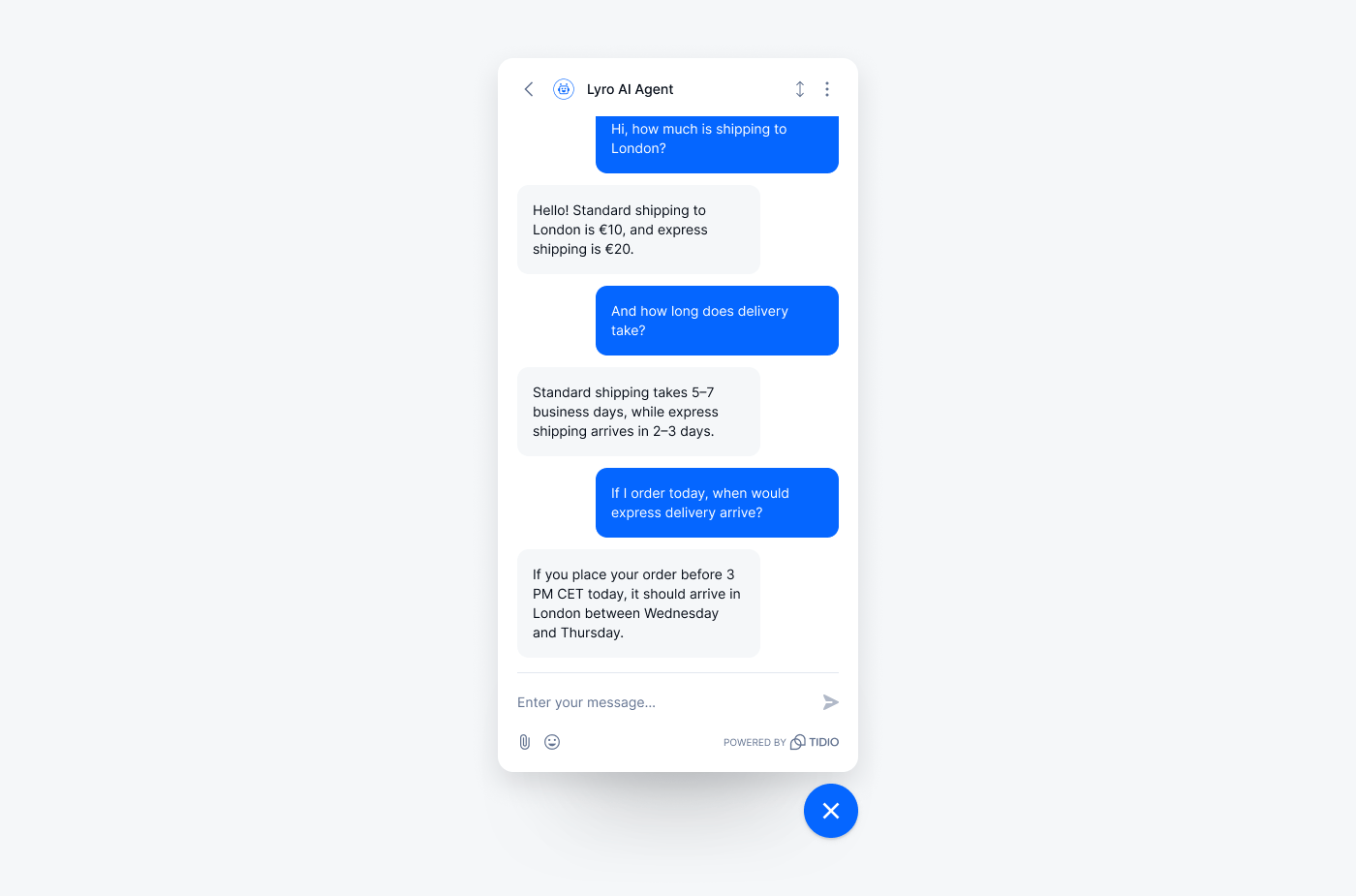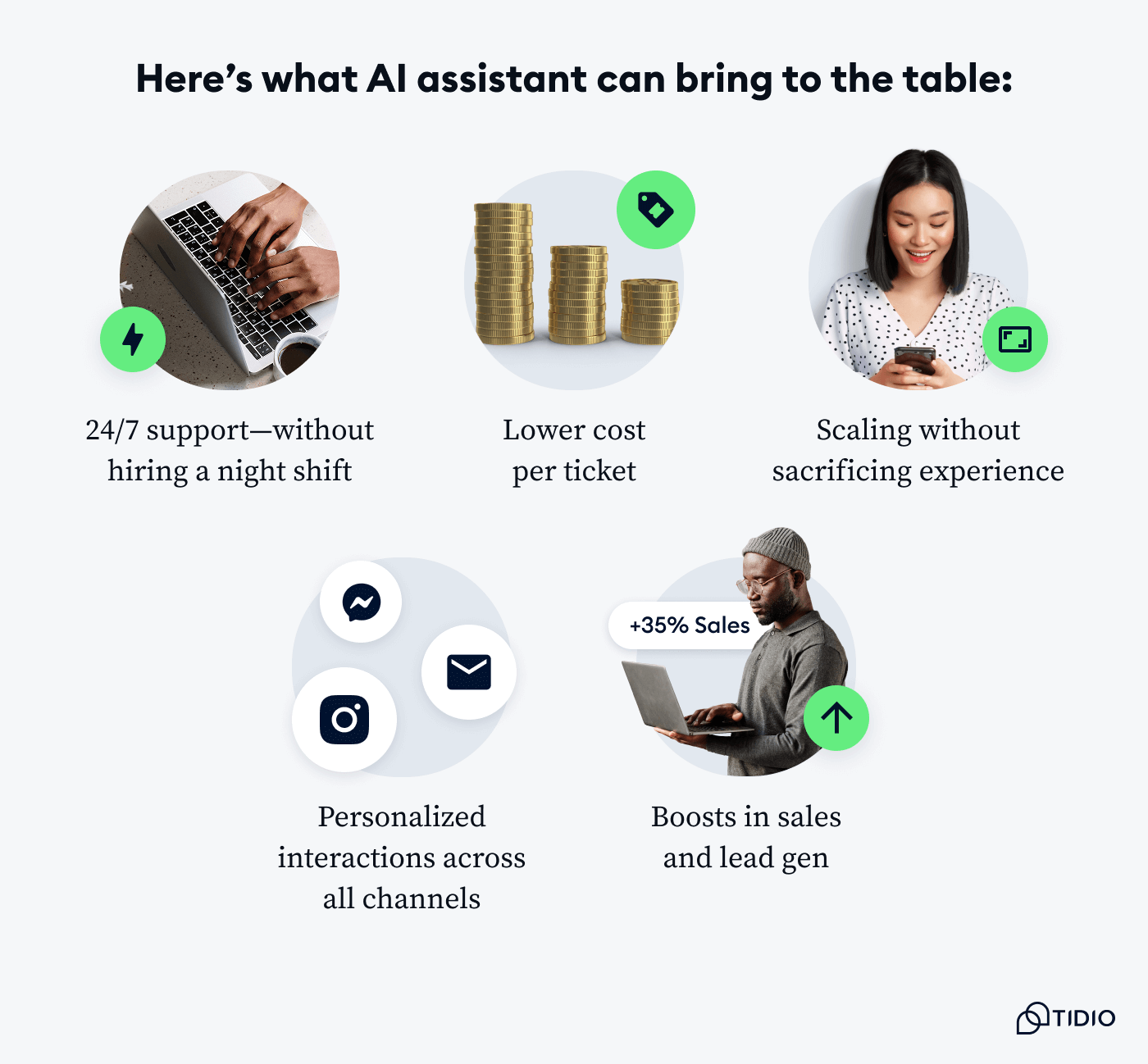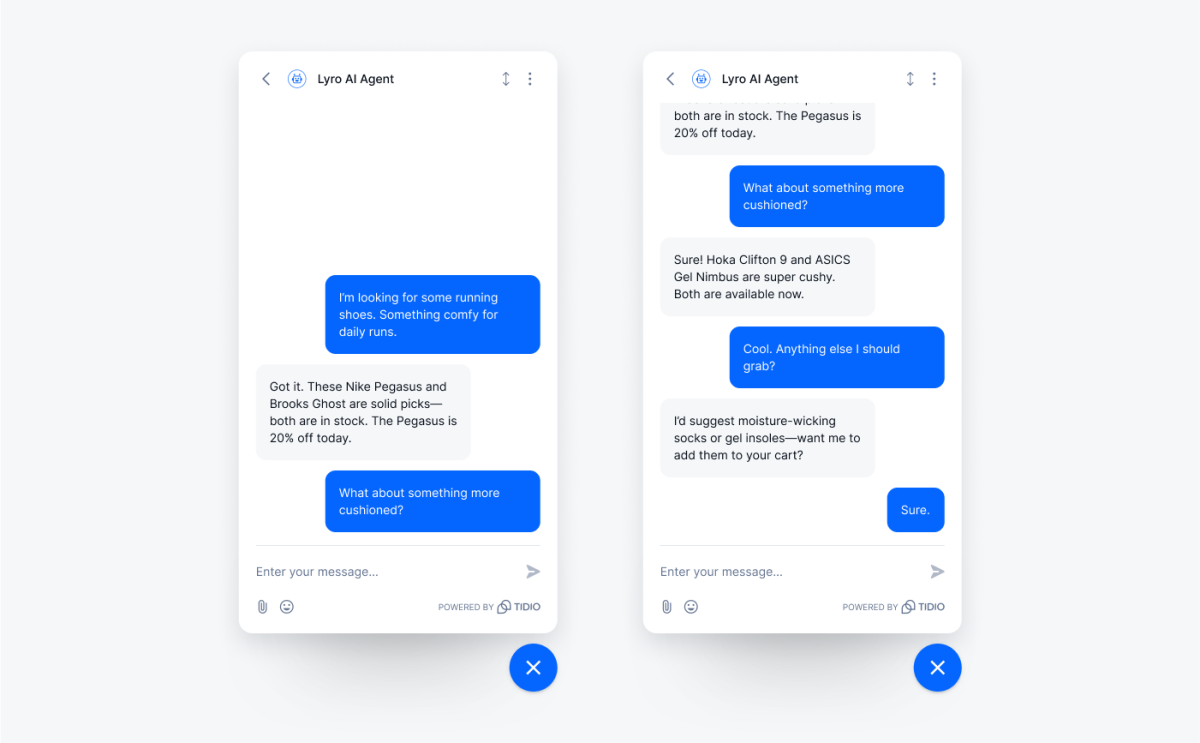AI virtual assistants for customer service are not about replacing human agents. Yes, the tech is evolving at fascinating rates, but the shift is about making human agents more effective and scalable.
Let’s get clear on terms.
An AI virtual assistant for customer service isn’t just a glorified chatbot. It’s a smart system trained on real interactions, capable of having dynamic conversations and solving customer issues in real time.
As many as 63% of service professionals strongly believe that generative AI will help them serve customers faster. And this is exactly where tools like AI virtual assistants come into play.
If you’re managing a high-volume support team or growing your customer service function, you can’t afford to ignore what AI assistants are already doing for your competitors.
Try Lyro AI and automate your customer support
Types of AI virtual assistants for customer service and what they do
About 85% of customer service leaders plan to explore or pilot a customer-facing conversational AI solution in 2025. It’s fairly certain AI will be the default setting for customer support agents.
But how can AI assistants for customer service be so accurate and trustworthy?
It’s because they tap into CRMs, regular and AI knowledge bases, help desk ticketing system histories, and even customer sentiment. Instead of spitting out scripted responses, the AI systems analyze context and respond accordingly.
Here’s a quick breakdown of the three main types of AI for CS:
- Rule-based chatbots (scripted bots): these use decision trees and pre-defined if/then logic to guide users through set paths. They don’t understand context or language nuance, but are fast and reliable as FAQ chatbots.
- NLP chatbots (intent recognition bots): these use Natural Language Processing (NLP) to understand user intent and extract key entities from messages. They’re more flexible than rule-based bots and can handle a wider range of queries with greater accuracy.
- AI assistants (LLM-powered agents): powered by large language models (think GPT-4, Claude, Gemini), these can generate human-like responses in real time. They can understand complex queries, learn from past interactions, and often handle 50–70% of tickets autonomously without rigid scripts.
Basically, AI assistants are the most superior type as they can learn over time to become even better at what they do. For example, if a customer asks about a late order, the assistant doesn’t just say “check your email.” It pulls the delivery status, confirms shipping details, and even flags delays proactively.

AI virtual assistants can, for example:
- Pull data from tools like Zendesk, HubSpot, or Shopify in real time
- Learn from past tickets to improve future interactions
- Adapt to language, tone, and customer behavior over time
Think of it like this: traditional chatbots are menu-driven, while AI assistants are conversation-driven and can learn over time to recognize intent.
Did you know that…
Tidio’s Lyro AI agent is a powerful customer service assistant that can resolve up to 67% of customer inquiries automatically, thanks to its ability to understand context and provide accurate, human-like responses. It works 24/7, reducing support load and improving response times without requiring complex setup or training.
Where AI virtual assistants are already making an impact
Best AI virtual assistants shine when it comes to handling the basics, at scale. They can route incoming tickets automatically based on urgency, topic, or customer profile, ensuring the right issues reach the right agents faster.
AI-powered virtual assistant chatbots also automate issue tagging, making it easier to sort and prioritize support queues. Most importantly, they handle common tier 1 questions like “Where’s my order?” or “What’s your return policy?” without needing human intervention. And these conversational AI tools for customer service do all of this instantly, around the clock.
Real-world examples of AI virtual assistants for customer service in action:
- Salesforce’s own AI is handling 30–50% of customer service tasks, tech support, and even engineering workflows across the company. According to CEO Marc Benioff, these AI agents are delivering responses with up to 93% accuracy on customer prompts.
- Vodafone UK employs its AI assistant TOBi, which manages over 70% of first‑contact support interactions. This type of AI virtual assistant software reduces wait times and boosts agent efficiency in handling more complex issues
- Your KAYA, a Polish eco-friendly personal care brand, transformed its customer service with Tidio’s Lyro AI. Tidio’s AI virtual assistant helped them achieve a 75% resolution rate and successfully unify multiple communication channels.
The key benefits of AI-powered virtual assistants for customer service

Now let’s address some tangible business-impact benefits. Nearly two-thirds (66%) of companies adopting AI for CS report increased productivity, 57% report cost savings, 55% claim the tech improved their faster decision-making customer experience. As with AI generally, early value often comes from internal use cases, but customer-facing cases are rising fast.
Here’s what AI assistants actually do for your team and your bottom line:
- 24/7 support: AI doesn’t need sleep, breaks, or vacation days. You can offer around-the-clock assistance without expanding your team.
- Lower cost per ticket: AI handles more tickets in less time. That’s fewer agent hours spent per resolution, and a direct hit to operational costs. In fact, 57% of companies say AI agents help them reduce costs.
- Scaling without sacrificing experience: as ticket volume grows, AI absorbs the overflow. No need to increase headcount every quarter.
- Personalized interactions across all channels: these assistants pull data from CRMs, previous interactions, and user behavior to deliver personalized replies that feel human. For example, AI-powered personalization can drive up to a 15% increase in revenue.
- Driving sales, not just support: Aside from answering questions, AI assistants can drive conversions. They can recommend products, answer pre-sales questions, and push offers based on browsing behavior. For example, Integratec managed to boost qualified lead generation by 25% using Tidio solutions.
Did you know that…
Tidio’s Lyro AI-powered product recommendations seamlessly integrate with your Shopify or e-commerce database to retrieve real-time product details (via RAG). This enables accurate product suggestions based on user intent—think specific SKUs, complementary products, variants, price ranges, alternatives, or seasonal picks.

This Tidio feature updates automatically with your inventory and works across multiple channels, like chat widgets and social media. The main benefit is that it can boost average order values while freeing support teams to focus on complex queries.
Where AI virtual assistants perform best
While it’s true that AI isn’t perfect for everything, virtual AI assistants do excel at the stuff humans don’t enjoy. These include:
- High-volume, low-complexity tasks: order tracking, password resets, subscription changes, these are predictable and repetitive. Perfect for AI.
- Enforcing consistent tone and policy: AI doesn’t get tired. It doesn’t snap at rude customers. It sticks to brand guidelines and support policies every time.
- Built-in multilingual support: many AI platforms (like Tidio or Intercom) offer translation in real time, so you can serve global customers without hiring multilingual reps.
- Pattern recognition and anomaly detection: AI flags issues like unusual return requests or repeat complaints before they become major problems.
- Real-time data integration: Assistants can instantly surface order history, shipping delays, or subscription plans, without the customer digging through emails.
Did you know that…
Tidio’s multilingual AI agents translate and localize up to 12 languages in real time, allowing businesses to provide 24/7 personalized service worldwide. This increases user experience, engagement, and removes manual language handling and integrations.
Read more: Learn how to craft chatbot personas to always be on-brand.
Real-world use cases of AI virtual assistants in action
So, what do AI-powered intelligent virtual assistants look like in practice? Here are some real-world examples that show how companies are using these systems to reduce workloads, speed up responses, and improve customer satisfaction.
Tidio helped Gecko Hospitality reach 90% customer service automation

Gecko Hospitality, a leading recruitment agency for the hospitality industry, was overwhelmed with repetitive customer queries. Most questions were basic, like how to apply or check application status. Their team was wasting time on tasks that could be automated.
The company then turned to Tidio’s Lyro AI Agent to handle these FAQs. Lyro could instantly respond to applicants, provide updates, and collect essential data like job preferences and contact information.
The impact was clear. Gecko Hospitality:
- Saved over 740 work hours in just 3 months
- Maintained 100% response accuracy
- Reduced time-to-first-response to zero
With the automation of simple, repetitive interactions, the company freed up recruiters to focus on high-value conversations. The result? A more efficient team, a better candidate experience, and time saved where it mattered most.
Read more: Check out the full story behind how Gecko Hospitality deployed Lyro to achieve numerous benefits.
Axioma deployed Lyro AI Agent and achieved an 89% resolution rate

Another great example of an AI virtual assistant customer service is Axioma, a sustainable fashion brand. The company was overwhelmed by customer inquiries during busy periods like product drops and Black Friday. Their small team struggled to keep up.
To fix this, Axioma implemented Tidio’s Lyro AI chatbot for customer service and automated 89% of conversations. It now answers inquiries about shipping, sizing, and returns, freeing up agents to handle more complex cases.
Axioma achieved the following benefits:
- Reduced support volume by 40%
- Consistent high-quality service during sales spikes
- Instant, accurate answers, 24/7
By automating common questions with Lyro, Axioma kept its lean support team efficient, even during high-traffic periods.
Read more: Check out the full Axioma case study and discover all the benefits they got by using Tidio’s Lyro.
AI for customer service means collaboration, not competition
According to a report by Deloitte, companies that combine AI with human agents see up to 25% higher customer satisfaction scores. This means that support agents aren’t going anywhere, but their role is evolving.
We should stop perceiving AI as a threat. Instead, we should understand that it’s a high-value teammate.
The tech helps agents work smarter by offering real-time reply suggestions and instantly pulling up product specifications. Throw in summarizing conversations across multiple channels, ticket automation, and boosted lead generation, and you will understand why the shift toward AI assistants is happening fast.
Lyro stands out as an easy-to-use and reliable option for those seeking an AI virtual assistant for small business. Tidio solutions are great for automating customer service and cutting operational costs. With Lyro, it’s easy to import your knowledge base data and make sure your visitors get accurate answers 24/7, even for more complex issues.
Looking to delight your customers and optimize CS costs without compromising quality?
Remake your customer service with AI

